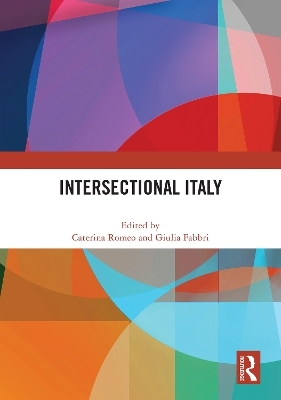
Intersectional Italy
Routledge (Verlag)
978-1-032-73541-2 (ISBN)
Intersectionality – a theoretical and methodological approach focusing on the multidimensional discrimination that individuals and groups experience based on their race, color, gender, and other axes of oppression – has only recently been embraced as an effective methodology in Italy, whose national identity is structured around the “chromatic norm” of whiteness. The categories of race and color have been almost absent in post-war public debate as well as in scholarly discourse. Feminist movements and theoreticians have mostly placed gender at the core of their analyses, leaving white privilege unchallenged and undertheorized. Colonial and postcolonial studies have linked present-day racism to Italian colonialism, thus shedding light on contemporary incarnations of Empire. In this volume, the authors adopt an intersectional methodology to question Italian “white innocence” and to examine the specificity of Italian racial discourse through the analysis of different kinds of texts and representations. The volume also includes two interviews with writers and intellectuals Djarah Kan and Leaticia Ouedraogo, who discuss how they articulate concepts of intersectionality, Blackness, white privilege, and structural racism in Italian contemporary culture and society.
The book will be of great significance to students, researchers and scholars of Migration and Postcolonial Studies interested in gender, class, and racial identity. The chapters in this book were originally published as a special issue of the Journal of Postcolonial Writing.
Caterina Romeo is Associate Professor at Sapienza University of Rome, where she teaches Literary Theory, Gender Studies, and Postcolonial Studies. She is the author of Interrupted Narratives and Intersectional Representations in Italian Postcolonial Literature (2023), Riscrivere la nazione (2018), and Narrative tra due sponde: Memoir di italiane d’America (2005). She has coedited the volume Postcolonial Italy: Challenging National Homogeneity (2012), and a special issue of the journal Postcolonial Studies titled Postcolonial Europe (2015). Giulia Fabbri is a Postdoctoral Fellow at Sapienza University of Rome, where she obtained a Ph.D. in Gender Studies. She is the author of Sguardi (post)coloniali. Razza, genere e politiche della visualità (2021) and has published in Italian and international journals. Her research areas include gender and racial politics in the colonial and postcolonial Italian context, the cultural production of Italian women of African descent, ecofeminism, and postcolonial and intersectional approaches to the Anthropocene.
Introduction: Of pink (and red) paint, Black lives (that matter), and intersectionality in Italy 1. The importance of self-definition: An interview with Djarah Kan 2. “Amplifying Black Italian voices”: An interview with Leaticia Ouedraogo 3. From Pecore nere to Future: Anthologizing intersectional Blackness in contemporary Italy 4. Making visible the invisible: Colonial sources and counter body-archives in the boarding schools for Black “mixed race” Italian children in fascist East Africa 5. Black women at war: The Shadow King (2019), Cronache dalla polvere (2019), and intersectional violence in contemporary Italy 6. “I wanted to become an Abyssinian”: Rewriting Indro Montanelli’s memories of colonial Africa in Francesca Melandri’s Sangue giusto (2017) 7. In the name of Destà: Artivism, corporeality, and “postcolonial pathways” 8. Shaping translingual writing and translation as intersectional practices: Nadeesha Uyangoda’s L’unica persona nera nella stanza and Sulla razza as case studies 9. Anti-gypsyism, intergenerational conflict, and intersectional dilemmas in the films of Laura Halilovic 10. Intersectional activism on social media: Anti-racist and feminist strategies in the digital space
| Erscheinungsdatum | 10.07.2024 |
|---|---|
| Verlagsort | London |
| Sprache | englisch |
| Maße | 174 x 246 mm |
| Gewicht | 450 g |
| Themenwelt | Geisteswissenschaften ► Sprach- / Literaturwissenschaft ► Anglistik / Amerikanistik |
| Geisteswissenschaften ► Sprach- / Literaturwissenschaft ► Literaturwissenschaft | |
| Sozialwissenschaften ► Ethnologie | |
| Sozialwissenschaften ► Soziologie | |
| ISBN-10 | 1-032-73541-4 / 1032735414 |
| ISBN-13 | 978-1-032-73541-2 / 9781032735412 |
| Zustand | Neuware |
| Haben Sie eine Frage zum Produkt? |
aus dem Bereich


